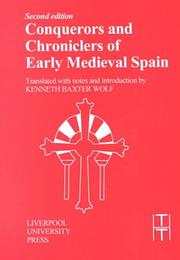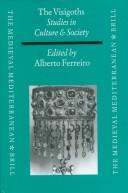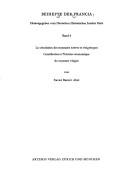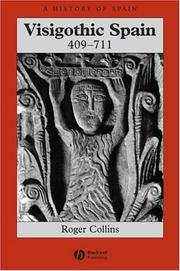| Listing 1 - 10 of 12 | << page >> |
Sort by
|

ISBN: 0853235546 9780853235545 1789623561 Year: 1999 Volume: 9 Publisher: Liverpool : Liverpool University Press,
Abstract | Keywords | Export | Availability | Bookmark
 Loading...
Loading...Choose an application
- Reference Manager
- EndNote
- RefWorks (Direct export to RefWorks)
From the perspective of the Hispano-Romans, the Visigoths who invaded Spain in the mid-fifth century were heretical barbarians. But Leovigild's military success and Reccared's conversion to Catholic Christianity led to more positive assessments of the Gothic role in Iberian history. John of Biclaro (c.590) and Isidore of Seville (c.625) authored histories that projected the Gothic achievements back on to their uncertain beginnings, transforming them from antagonists of the Roman Empire to protagonists of a new, independent Chistianity in Spain. -- Amazon.com.
Goths --- History --- Sources --- Histoire --- Spain --- Espagne --- Sources. --- Visigoths --- Muslims --- Visigoths in Spain --- West Goths --- [chroniques]
Book
ISBN: 843690382X 9788436903829 Year: 1975 Volume: 84 Publisher: Madrid Ministerio de Educación y ciencia. Dirección general del patrimonio artístico y cultural. Comisaría nacional del patrimonio artistico
Abstract | Keywords | Export | Availability | Bookmark
 Loading...
Loading...Choose an application
- Reference Manager
- EndNote
- RefWorks (Direct export to RefWorks)
Tombs --- Segóbriga (Extinct city) --- -Segobriga (Extinct city) --- Segóbriga (Ancient city) --- Spain --- Antiquities --- Visigoths --- Segóbriga (Extinct city) --- Segóbriga (Extinct city). --- Visigoths in Spain --- Tombs - Spain - Cuenca
Book
ISBN: 8431304227 9788431304225 Year: 1976 Publisher: Pamplona Eunsa
Abstract | Keywords | Export | Availability | Bookmark
 Loading...
Loading...Choose an application
- Reference Manager
- EndNote
- RefWorks (Direct export to RefWorks)
Church history --- Visigoths --- Visigoths in Spain --- Christianity --- Middle Ages, 600-1500 --- Spain --- Church history. --- Church history - Middle Ages, 600-1500 --- Visigoths - Spain --- Spain - Church history
Book
ISBN: 9048531306 9462981647 Year: 2020 Publisher: Amsterdam : Amsterdam University Press,
Abstract | Keywords | Export | Availability | Bookmark
 Loading...
Loading...Choose an application
- Reference Manager
- EndNote
- RefWorks (Direct export to RefWorks)
This study of the Visigothic kingdom monetary system in southern Gaul and Hispania from the fifth century through the Muslim invasion of Spain fills a major gap in the scholarship of late antiquity. Examining all aspects of the making of currency, it sets minting in relation to questions of state - monarchical power, administration and apparatus, motives for money production - and economy. In the context of the later Roman Empire and its successor states in the west, the minting and currency of the Visigoths reveal shared patterns as well as originality. The analysis brings both economic life and the needs of the state into sharper focus, with significant implications for the study of an essential element in daily life and government. This study combines an appreciation for the surprising level of sophistication in the Visigothic minting system with an accessible approach to a subject which can seem complex and abstruse.
Money --- Visigoths --- Visigoths in Spain --- Currency --- Monetary question --- Money, Primitive --- Specie --- Standard of value --- Exchange --- Finance --- Value --- Banks and banking --- Coinage --- Currency question --- Gold --- Silver --- Silver question --- Wealth --- History --- Spain --- Early Medieval Economy. --- Islamic Conquest in Iberia. --- Visigothic Currency.
Book
ISBN: 1789699606 9781789699609 1789699592 9781789699593 Year: 2021 Publisher: Oxford : Archaeopress,
Abstract | Keywords | Export | Availability | Bookmark
 Loading...
Loading...Choose an application
- Reference Manager
- EndNote
- RefWorks (Direct export to RefWorks)
This book presents a study of three famous usurpations of the Visigothic period: the uprising of Prince Hermenegild (579-585); the rebellion of Duke Argimundo at the beginning of the reign of Recaredo; and Duke Theudemirus and the role he played in the transmission of power between Visigoths and Arabs after the fall of the kingdom of Toledo.
Visigoths --- Antiquities. --- Archaeological specimens --- Artefacts (Antiquities) --- Artifacts (Antiquities) --- Specimens, Archaeological --- Material culture --- Archaeology --- Visigoths in Spain --- Toledo (Spain) --- Ṭulayṭula (Spain) --- Ṭulaiṭula (Spain) --- Tolède (Spain) --- History

ISBN: 9004112065 9789004112063 9789004474581 9004474587 Year: 1999 Volume: 20 Publisher: Leiden ; Boston : Brill,
Abstract | Keywords | Export | Availability | Bookmark
 Loading...
Loading...Choose an application
- Reference Manager
- EndNote
- RefWorks (Direct export to RefWorks)
The study of the Visigoths continues to be one of the most actively researched topics in Late Antique Studies. As might be expected the vast majority of the work has been carried out in Europe and especially by scholars from the Iberian Peninsula. There has always been a need, however, to make much of this research accessible to English language specialists and the wider academic community in Late Antiquity Studies. Too often Late Antiquity Studies tend to ignore or marginalize the Iberian Peninsula and this may be due in part to the lack of access to this scholarship in the English language. This volume of essays has as one of its goals to ameliorate such a deficiency. The scholars who participated in this volume are both from Europe and North America. They also represent scholars who are well known and those who are establishing distinguished scholarly reputations. Although thematically the essays do not exhaust the broad nature of Visigothic studies, they do nevertheless offer an impressive array of topics. Coverage includes research on Visigothic identity in Gaul, regional studies on Galicia and Lusitania, anti-Semitism in Visigothic law, the political grammar of Ildephonsus of Toledo, monasticism and liturgy, numismatics, Roman-Visigothic pottery in Baetica, urban and rural archaeology, and Gothic consciousness among Mozarab communities.
Visigoths --- Suevi (Germanic people) --- Wisigoths --- Suèves --- Suevi (Germanic people). --- Visigoths. --- West-Goten. --- France. --- Portugal. --- Spain. --- Suèves --- Spain --- Portugal --- France --- Visigoths in Spain --- Suebi (Germanic people) --- Suevi --- Suevians (Germanic people) --- Ethnology --- Germanic peoples --- Swabians --- Visigoths - Spain. --- Suevi (Germanic people) - Portugal. --- Visigoths - France.

ISBN: 3760846548 9783760846545 Year: 1976 Volume: 4 Publisher: München Artemis
Abstract | Keywords | Export | Availability | Bookmark
 Loading...
Loading...Choose an application
- Reference Manager
- EndNote
- RefWorks (Direct export to RefWorks)
Coins, Visigothic --- Coins, Suevian --- Numismatics --- Suevi (Germanic people) --- Visigoths --- -Coins, Visigothic --- -Numismatics --- -Suevi (Germanic people) --- -Visigoths --- -West Goths --- Goths --- Suevi in Spain --- Archaeology --- Auxiliary sciences of history --- History --- History, Ancient --- Visigothic coins --- Suevian coins --- -Coins, Suevian --- Visigoths in Spain --- Coins, Visigothic - Spain --- Coins, Suevian - Spain --- Numismatics - Spain --- Suevi (Germanic people) - Spain --- Visigoths - Spain

ISBN: 1405149663 9781405149662 0631181857 9780631181859 Year: 2006 Publisher: Malden, MA Oxford : Blackwell,
Abstract | Keywords | Export | Availability | Bookmark
 Loading...
Loading...Choose an application
- Reference Manager
- EndNote
- RefWorks (Direct export to RefWorks)
"Between the end of Roman rule in the early fifth century and the Arab conquest in the eight, Spain's destiny lay with the Visigoths, a confederacy of different ethnic groups formed in the Balkans in the later fourth century. Taking account of important new documentary evidence and of the latest archaeological findings, the author presents a wealth of original theories, challenging many traditional assumptions about Visigothic Spain - about how the Visigothic kingdom was governed, law in the kingdom, the nature and methods of the Arab conquest, and the rise of Spain as an intellectual force in the West."--Jacket
Visigoths --- Wisigoths --- 946.01 --- Geschiedenis van Spanje: vroegste periode; Romeinen; Carthagers; Wisigothen--(tot 711) --- 946.01 Geschiedenis van Spanje: vroegste periode; Romeinen; Carthagers; Wisigothen--(tot 711) --- Visigoths in Spain --- Spain --- Civilization --- History --- Espagne --- Histoire --- Civilisation --- Gothic period, 414-711 --- To 711 --- Visigoths - Spain --- 414-711 (Période gothique) --- 414-711
Book
ISBN: 8424934962 Year: 1977 Publisher: Madrid Gredos
Abstract | Keywords | Export | Availability | Bookmark
 Loading...
Loading...Choose an application
- Reference Manager
- EndNote
- RefWorks (Direct export to RefWorks)
Visigoths --- -West Goths --- Goths --- Spain --- History --- -Spanje --- geschiedenis --- -Spain --- geschiedenis. --- Spanje --- -Visigoths --- Espanja --- Spanien --- Hiszpania --- Spanish State --- España --- Estado Español --- Espagne --- Hispania --- Sefarad --- Sepharad --- Shpanye --- Shpanie --- Reino de España --- Kingdom of Spain --- Reino d'Espanya --- Reinu d'España --- Espainiako Erresuma --- Regne d'Espanya --- Reiaume d'Espanha --- Espanya --- Espanha --- スペイン --- Supein --- イスパニア --- Isupania --- Visigoths in Spain
Book
ISBN: 9048543592 9463725903 Year: 2020 Publisher: Amsterdam : Amsterdam University Press
Abstract | Keywords | Export | Availability | Bookmark
 Loading...
Loading...Choose an application
- Reference Manager
- EndNote
- RefWorks (Direct export to RefWorks)
This volume examines how power was framed in Visigothic society and how a diverse population with a complex and often conflicting cultural inheritance was thereby held together as a single kingdom. Indeed, through this dynamic process a new, early medieval society emerged. Understanding this transformation is no simple matter, as it involved the deployment of an array of political and cultural resources: the production of knowledge, the appropriation of Patristic literature, controlling and administering rural populations, reconceptualizing the sacred, capital punishment and exile, controlling the manufacture of currency, and defining Visigothic society in relation to other polities such as the neighbouring Byzantine state. In order to achieve an analysis of these different phenomena, this volume brings together researchers from a variety of disciplines. This interdisciplinary approach therefore expands the available sources and reformulates topics of traditional scholarship in order to engage with a renewal of Visigothic Studies and reformulate the paradigm of study itself. As a result, this volume rethinks frameworks of power in the Peninsula along not only historical and archaeological but also anthropological terms, presenting the reader with a new understanding of Iberian society as a whole.
Visigoths --- Visigoths in Spain --- Early Medieval Spain, Visigothic Society, Late Antiquity, Early Medieval History. --- Spain. --- Espagne --- Espainiako Erresuma --- España --- Espanha --- Espanja --- Espanya --- Estado Español --- Hispania --- Hiszpania --- Isupania --- Kingdom of Spain --- Regne d'Espanya --- Reiaume d'Espanha --- Reino de España --- Reino d'Espanya --- Reinu d'España --- Sefarad --- Sepharad --- Shpanie --- Shpanye --- Spanien --- Spanish State --- Supein
| Listing 1 - 10 of 12 | << page >> |
Sort by
|

 Search
Search Feedback
Feedback About UniCat
About UniCat  Help
Help News
News